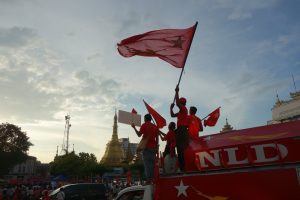An unofficial tabulation of the vote from Myanmar’s general election showed Tuesday that the ruling National League for Democracy (NLD) party of Nobel Peace Prize laureate Aung San Suu Kyi won an absolute majority of seats in parliament, giving it a second five-year term in power.
The official results of the Sunday election posted online by the state Union Election Commission (UEC) lagged far behind, but also showed the advantage going to the NLD. They confirmed that Aung San Suu Kyi won the seat she contested. The NLD claimed victory on Monday.
Yway Mal, an independent vote counting service, said the NLD has won 366 seats so far in the combined upper and lower houses, exceeding the 322 needed for control. The military-backed Union Solidarity and Development Party, the main opposition party, has so far captured 21 seats, the agency said. It said 48 seats were won by other parties.
Aung San Suu Kyi’s party had been expected to win the polls even though her administration has fallen short of expectations, achieving only modest economic growth and failing to end the decades-long conflict with ethnic minority groups seeking more autonomy in the border areas they consider their homelands.
She remains by far the country’s most popular politician, a beloved figure because of her long non-violent struggle against military rule. There also was no credible opposition figure or party offering policy alternatives.
More than 90 parties contested the election and 37 million people were eligible to cast ballots, including 5 million first-time voters.
Suu Kyi’s party won a landslide victory in the 2015 election to end more than five decades of military rule and make her Myanmar’s leader. However, the army-drafted 2008 constitution automatically grants the military enough seats in parliament to block constitutional change.
There was criticism, especially from abroad, that this year’s election was flawed. The criticism focused on the Muslim Rohingya minority, who are generally denied citizenship and not allowed to vote. In 2017, their area in western Myanmar was targeted by a brutal counter-insurgency program by the army which drove about 740,000 Rohingya across the border to seek safety in neighboring Bangladesh.
U.S. Secretary of State Mike Pompeo said Myanmar’s second competitive national election since military rule ended was an important step.
“Nevertheless, we are concerned by the large number of unelected seats constitutionally reserved for the military; the disfranchisement of groups including Rohingya; cancellation of voting in parts of several states and regions; and the disqualification of candidates based on arbitrary application of citizenship and residency requirements, which prevent the realization of a more democratic and civilian government,” Pompeo said in a statement.
Saw Zin Maung Soe, founder of CAN-Myanmar, a local election observation group, blamed the slow release of the official results on flaws in the UEC.
“The information flow in the electoral body is weak and there was not enough training for the members of the commission across the country,” he said. He added that the state body was also reluctant to cooperate with independent election observers.
By Pyae Sone Win for the Associated Press in Yangon, Myanmar.

































